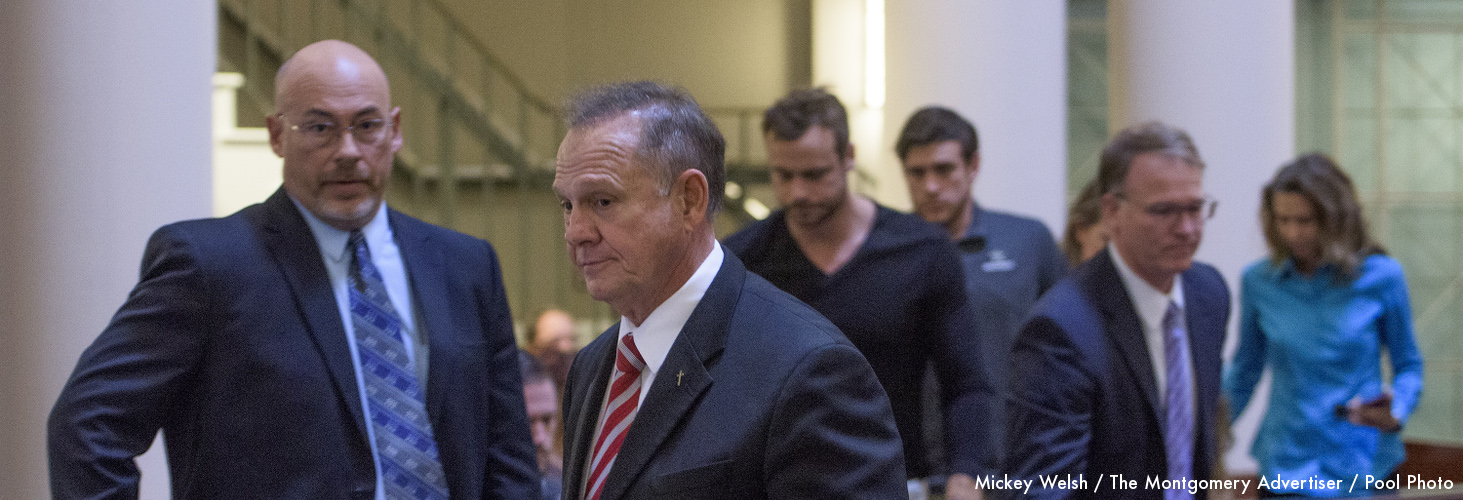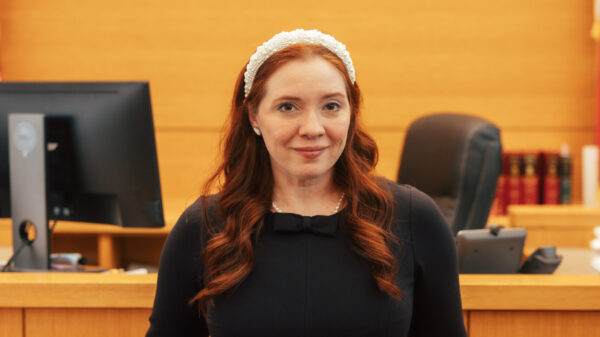By Chip Brownlee
Alabama Political Reporter
MONTGOMERY — Suspended Alabama Supreme Court Chief Justice Roy Moore on Wednesday filed a final written brief with the specially empaneled supreme court convened to hear his appeals trial.
The brief is Moore’s final filing before his appeal goes to oral arguments.
The 50-page brief, filed by Moore’s attorneys at the Liberty Counsel, reiterates many of Moore’s arguments in his September ethics trial and in his previous brief submitted in December.
His attorneys argue that the Judicial Inquiry Commission and the Court of the Judiciary had no authority to review his four-page administrative order, which is the basis of the ethics charges brought against him.
During the trial, the Judicial Inquiry Commission successfully argued to the COJ that Moore had violated the Alabama Canons of Judicial Ethics by issuing the “improper” administrative order to the State’s 67 probate judges, directing them to defy federal law.
Moore argues in his brief that the authority to review administrative orders rests solely with the Alabama Supreme Court and allowing the Commission and the Court of the Judiciary to interpret Moore’s administrative order would set “dangerous precedent.”
“The JIC did not have the authority to review the Administrative Order,” said Mat Staver, founder of Liberty Counsel. “That authority belongs only to the Alabama Supreme Court and that court did not modify or overrule that order. Any objective review of this case must conclude that Chief Justice Moore did nothing wrong and should have never been charged.”
The Judicial Inquiry Commission said Moore’s administrative order, issued on Jan. 6, 2016, directed the probate judges to defy the US Supreme Court’s 2015 ruling in Obergefell v. Hodges, which effectively legalized same-sex marriage in all 50 states.
In the order, Moore said probate judges had a “ministerial duty” to not issue same-sex marriage licenses because of previous Alabama Supreme Court rulings and Alabama’s traditional marriage amendments.
Moore’s attorneys argue that his order didn’t tell “anyone what to do” and was simply an update or an overview of existing precedent and law regarding same-sex marriage in Alabama.
On top of the assertions that the COJ overstepped its authority and that the JIC never proved their charges, Moore’s attorneys also say the law’s requirement for suspension after any charges are filed against a judge, even before the case goes to trial, is also unconstitutional.
Moore was first temporarily suspended in May before his trial in September, after which time he was permanently suspended.
The Court of the Judiciary found Moore guilty of violating judicial ethics but the Court failed to agree unanimously to remove Moore from the bench. Instead, a majority of the judges agreed to suspend Moore for the remainder of his term.
“The JIC violated the rule of law and the COJ violated clear law when it de facto removed Chief Justice Moore when the order admits the court did not have the required unanimous vote to remove,” said Staver.
Moore’s suspension this year wasn’t the first time the Court of the Judiciary effectively removed Moore from his job as the State’s top judicial officer. He was removed once before in 2003 for violating a Federal court order to remove a two-ton granite Ten Commandments monument from the State’s Judicial Building.
The Court completely removed him from his post during that go-around.
Moore ran for Chief Justice again in 2012, winning by a large margin. He began his six-year term in 2013, and it’s set to expire in 2019, at which time he will be too old under Alabama law to run for reelection.
The COJ’s suspension, if upheld by the Special Supreme Court, will be the end of Moore’s judicial career.
The 7-member panel of the Special Supreme Court is made up of randomly-selected former Alabama Circuit and Appeals Court judges.
The Special Court was empaneled after the remaining Alabama Supreme Court justices recused themselves from the case in October for their prior involvement in Moore’s case and their closeness to him as a colleague.
Moore’s attorneys requested a 30–45-minute oral argument to present their case to the Special Supreme Court when the case heads to trial. Now that Moore’s attorneys have filed their final reply brief, the case will head to oral arguments this year.
Email Chip at [email protected] or follow him on Twitter.




















































